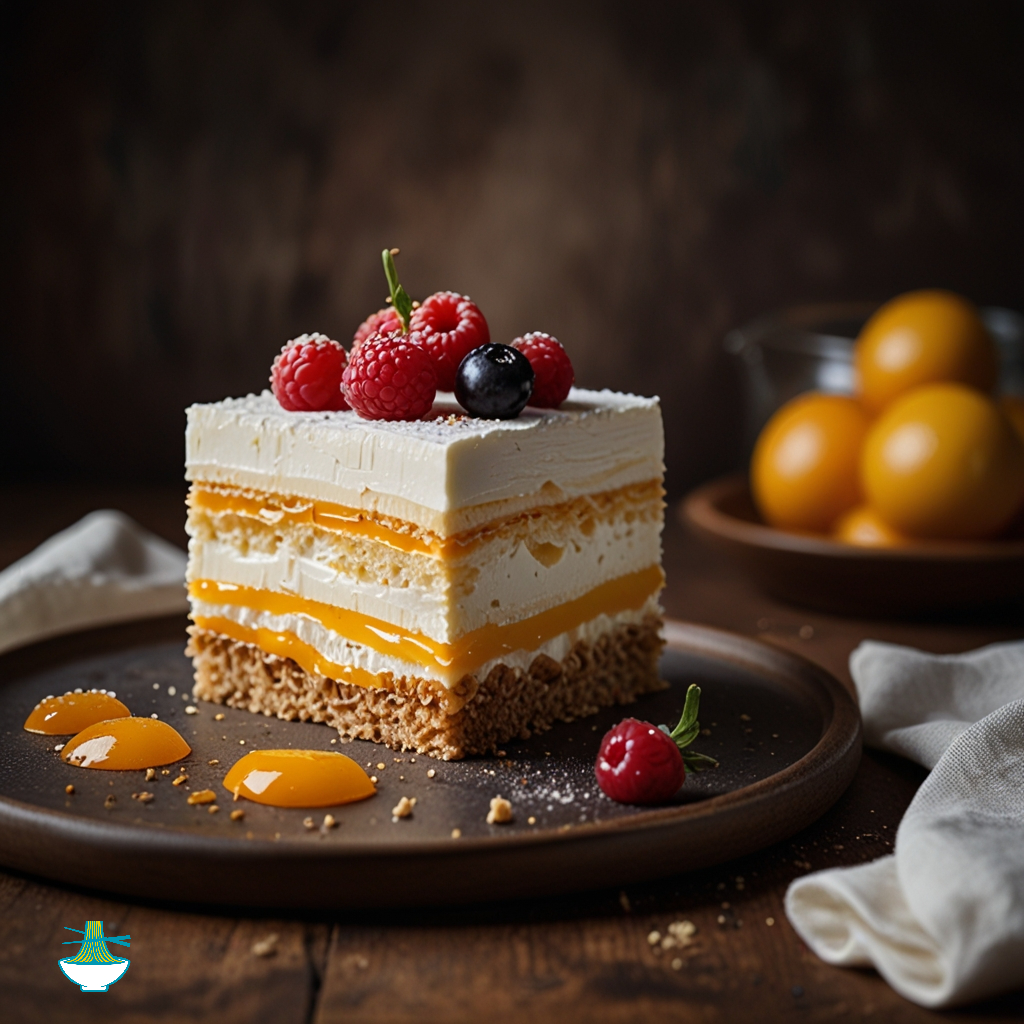Esh Asaraya, a delectable Middle Eastern dessert, is a harmonious blend of creamy cheese, luscious cream, and a base of bread or cake, all brought together with a generous drizzle of sugar syrup. Its name translates to "bread of the harem" in Arabic, reflecting its indulgent and luxurious nature historically enjoyed by royals and elites.
Rooted in the rich culinary traditions of the Levant region, particularly popular in countries like Jordan, Palestine, and Syria, Esh Asaraya has evolved over centuries. It draws inspiration from Ottoman cuisine, where ingredients like soft cheese and sugar syrup were cherished delicacies.
This layered dessert not only tantalizes the taste buds but also embodies cultural heritage, passed down through generations as a symbol of celebration and hospitality. Today, Esh Asaraya continues to captivate dessert enthusiasts worldwide, offering a delightful fusion of flavors and a glimpse into the culinary legacy of the Middle East.
Ingredients:
- 500g soft cheese (such as cream cheese or ricotta)
- 200ml heavy cream
- 1 cup sugar
- 1 cup water
- 1 teaspoon vanilla extract
- 1 loaf of white bread or sponge cake (cut into slices)
Instructions:
1. In a mixing bowl, combine the soft cheese and heavy cream until smooth and creamy. Set aside.
2. In a saucepan, mix sugar, water, and vanilla extract. Bring to a boil, then reduce heat and simmer for 5-7 minutes until slightly thickened to make the sugar syrup.
3. Arrange a layer of bread or cake slices in the bottom of a serving dish.
4. Pour a portion of the sugar syrup over the bread or cake layer, allowing it to soak in.
5. Spread a layer of the cheese mixture evenly over the soaked bread or cake.
6. Repeat the layers with the remaining bread or cake slices, sugar syrup, and cheese mixture until all ingredients are used, ending with a layer of cheese mixture on top.
7. Cover the dish and refrigerate for at least 4 hours or overnight to allow the flavors to meld and the dessert to set.
8. Serve chilled, optionally garnished with nuts or fruit slices, and enjoy this delightful Esh Asaraya dessert!
Nutrition Value:
1. Soft Cheese (500g):
- Calories: Approximately 1600 kcal
- Carbohydrates: Negligible
- Protein: Approximately 60g
- Fat: Approximately 140g
- Sodium: Varies depending on brand and type, typically around 1000-1500mg
- Cholesterol: Approximately 500-700mg
- Nutritional Benefits: Rich in calcium, protein, and fat. Provides essential nutrients for bone health and muscle function.
2. Heavy Cream (200ml):
- Calories: Approximately 800 kcal
- Carbohydrates: Approximately 8g
- Protein: Approximately 4g
- Fat: Approximately 88g
- Sodium: Approximately 60mg
- Cholesterol: Approximately 275mg
- Nutritional Benefits: High in fat and calories, provides energy and adds creaminess to the dessert. Contains vitamins A and D, important for vision and bone health.
3. Sugar (1 cup):
- Calories: Approximately 800 kcal
- Carbohydrates: Approximately 200g
- Protein: Negligible
- Fat: Negligible
- Sodium: Negligible
- Cholesterol: Negligible
- Nutritional Benefits: Provides quick energy but lacks essential nutrients. Should be consumed in moderation.
4. Water (1 cup):
- Calories: 0 kcal
- Carbohydrates: 0g
- Protein: 0g
- Fat: 0g
- Sodium: 0mg
- Cholesterol: 0mg
- Nutritional Benefits: Essential for hydration and overall bodily functions. No calories or macronutrients, but crucial for life.
5. Vanilla Extract (1 teaspoon):
- Calories: Approximately 12 kcal
- Carbohydrates: Approximately 0.6g
- Protein: Negligible
- Fat: Negligible
- Sodium: Negligible
- Cholesterol: Negligible
- Nutritional Benefits: Adds flavor and aroma to the dessert. Contains small amounts of antioxidants and may have calming effects.
6. White Bread or Sponge Cake (1 loaf):
- Calories: Varies depending on size and recipe, approximately 1000-1500 kcal
- Carbohydrates: Varies, typically 200-300g
- Protein: Varies, typically 20-30g
- Fat: Varies, typically 10-20g
- Sodium: Varies, typically 1000-2000mg
- Cholesterol: Varies, typically 0-100mg
- Nutritional Benefits: Provides carbohydrates for energy. May contain some vitamins and minerals depending on ingredients used, but often lacks significant nutritional value beyond energy.


Comments